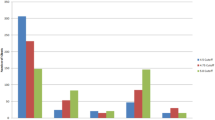Abstract
Objective: The topic of money is ubiquitous to psychodynamic therapy work, yet often neglected in residency training programs. Residency allows a unique opportunity to address issues pertaining to money and their impact on therapy. Method: Through the experience of the author, the need for a more explicit and systematic consideration within residency training of financial issues is explored. Perspectives from the relevant literature, therapeutic principles, and their impact on resident training are discussed for several topics. These topics include the difficulties encountered in discussing fees, the negotiation of fees, impact on the stability of the frame, expectations of patients and residents, payment of fees, and handling missed appointments. The applicability of these skills to other venues of practice is highlighted. Conclusions: By addressing the topic of money and fees in residency training, a richer educational experience can be realized.
Similar content being viewed by others
References
Kreuger DW: Money meanings and madness: a psychoanalytic perspective. Psychoanal Review 1991; 78: 209–224
Meyers BS: Attitudes of psychiatric residents toward payment of psychotherapy fees. Am J Psychiatry 1976; 133: 1460–1462
Buckley P, Karasu T, Charles E: Common mistakes in psychotherapy. Am J Psychiatry 1979; 136: 1578–1580
Freud S: On the beginning of treatment, in The Standard Edition of the Complete Psychological Works of Sigmund Freud. Edited by Strachey J. New York, WW Norton & Co, 1976, pp 123–144
Pasternack SA: The psychotherapy fee: an issue in residency training. Dis Nerv Syst 1977; 38: 913–916
Dibella GAW: Mastering money issues that complicate treatment: the last taboo. Am J Psychother 1980; 24: 510–522
Mohl PC, Lomax J, Tasman A, et al: Psychotherapy training for the psychiatrist of the future. Am J Psychiatry 1990; 147: 7–13
Geistwhite R: Inadequacy and indebtedness. J Psychother Pract Res 2000; 9: 142–148
Stolorow RD: Toward a functional definition of narcissism. Int J Psychoanal 1975; 56: 179–185
Chodoff P: Psychoanalysis and fees. Compr Psychiatry 1964; 5: 137–145
Tulipan AB: Fees in psychotherapy. J Am Acad Psychoanalysis 1983; 11: 445–463
Schonbar RA: The fee as a focus for transference and countertransference. Am J Psychother 1967; 21: 275–285
Pasternack SA: The clinical management of fees during psychotherapy and psychoanalysis. Psychiatr Ann 1988; 18: 112–117
Dimen M: Money, love and hate: contradiction and paradox in psychoanalysis. Psychoanalytic Dialogues 1994; 4: 69–100
Allen A: The fee as a therapeutic tool. Psychoanal Q 1971; 44: 132–140
Koren L, Joyce J: The treatment implications of payment of fees in a clinic setting. Am J Orthopsychiatry 1953; 23: 350–357
West JC, Wilk JE, Rae DS, et al: Financial disincentives for the provision of psychotherapy. Psychiatr Serv 2003; 54: 1582–1588
Gutheil TG, Gabbard G: The concept of boundaries in clinical practice: theoretical and risk management dimensions. Am J Psychiatry 1993; 150: 188–196
Menninger K: Theory of Psychoanalytic Technique, 2nd ed. New York, Basic Books, 1973
Haak N: Comments on the analytic situation. Int J Psychoanal 1957; 38: 183
Glover E: The Technique of Psychoanalysis, Revised Ed. New York, International University Press, 1968
Marmor J: A reevaluation of certain aspects of psychoanalytic theory and practice, in Modern Concepts of Psychoanalysis. Edited by Salzmann JM. New York, Philosophical Library, 1962, pp 189–205
Erle JB: On the setting of analytic fees. Psychoanal Q 1993; 42: 106–108
Gedo J: A note on nonpayment of psychiatric fees. Int J Psychoanal 1963; 44: 368–371
Eissler KR: On some theoretical and technical problems regarding payment of fees for psychoanalytic treatment. Int Rev Psychoanal 1974; 1: 73–101
Blackmon WD: Are psychoanalytic billing practices ethical? Am J Psychother 1993; 47: 613–620
Fromm-Reichmann F: Principles of Intensive Psychotherapy. Chicago, University of Chicago Press, 1960
Metzl JM, Riba M: Understanding the symbolic value of medications: a brief review. Primary Psychiatry 2003; 10: 45–48
Author information
Authors and Affiliations
Corresponding author
Additional information
This article is one winner of this year’s Frieda Fromm-Reichmann Fellowship Award for Residents, cosponsored by the Endowment for the Advancement of Psychotherapy and the American Association of Directors of Psychiatric Residency Training.
Rights and permissions
About this article
Cite this article
Newman, S.S. Considering Fees in Psychodynamic Psychotherapy: Opportunities for Residents. Acad Psychiatry 29, 21–28 (2005). https://doi.org/10.1176/appi.ap.29.1.21
Published:
Issue Date:
DOI: https://doi.org/10.1176/appi.ap.29.1.21




